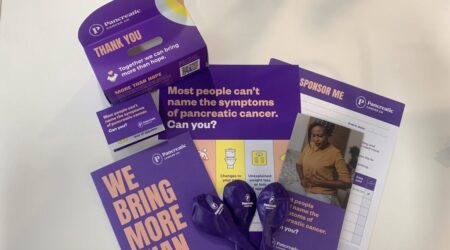Jon Holmes said: “The film has a simple premise. People are missing from our lives because of pancreatic cancer – the deadliest common cancer. By removing famous actors who’ve died from the disease from their famous scenes in their famous films I hope we can draw attention to what else is missing: a simple test to detect pancreatic cancer early.”
A simple test is within reach
Right now, the brutal reality is that diagnosis comes far too late for most and families are left with only hope to hold on to. But the disease must be detected sooner.
And it can be. Early diagnosis is the key to survival and thanks to research breakthroughs, a test to detect pancreatic cancer is within reach. It would save thousands of lives every year.
We’re calling on governments to do more to make this a reality. More drive, more investment, more attention. So, we can give people with pancreatic cancer more than hope.
It’s time to unite, diagnose and save lives.
Sign our letter now
Diana Jupp said: “Right now, it is nearly impossible for GPs to diagnose pancreatic cancer in time to save people. The vital early detection tests they need are missing because research into this devastating disease has been vastly underfunded by successive governments. Thousands of families feel the heartbreaking consequences of this lack of action every year. Unlike other cancers where incredible strides have been made, people affected pancreatic cancer are all too often left with only hope to hold on to.
“Change is possible – we have made more progress in the last five years than in the last 50 combined. But, to make early detection a reality governments must do more. We need more drive, more investment, more attention devoted to the deadliest common cancer. Please sign our open letter. It’s time to unite, diagnose and save lives.”




